If you're interested in web development, PHP (Hypertext Preprocessor) is a versatile and widely used scripting language that you should consider learning. Whether you're a beginner starting from scratch or someone with some programming experience looking to expand your skill set, this comprehensive guide will provide you with the essential steps and resources to learn PHP effectively.
1. Understand the Basics:
Before delving into PHP, it's important to have a solid understanding of web development fundamentals. Familiarize yourself with HTML (Hypertext Markup Language) and CSS (Cascading Style Sheets) as they form the foundation of web pages. Understanding how these languages interact with PHP will give you a better grasp of developing dynamic and interactive websites.
2. Set Up Your Development Environment:
To start learning PHP, you'll need a suitable development environment. You can set up a local server environment using software like XAMPP (Windows, macOS, Linux) or MAMP (macOS), which provide an easy way to install PHP, Apache, and MySQL on your computer. Alternatively, you can use online platforms that offer pre-configured PHP environments. Select the alternative that best meets your requirements and tastes.
3. Learn the Syntax:
To become proficient in PHP, you must familiarize yourself with its syntax and core concepts. Start by understanding variables, data types, operators, conditionals, loops, functions, and arrays. The official PHP documentation is an excellent resource that provides detailed explanations and examples for each concept. Combine theoretical knowledge with practical exercises to reinforce your understanding.
4. Build the Building Blocks:
As you progress, it's crucial to learn about the essential building blocks of PHP. This includes working with forms and handling user input, managing files and directories, error handling and exception management, and interacting with databases using PHP's built-in MySQL extensions or modern alternatives like PDO (PHP Data Objects). Mastering these concepts will empower you to develop dynamic and interactive web applications.
5. Utilize Frameworks and Libraries:
To enhance your PHP development process and make your code more efficient and maintainable, explore popular PHP frameworks and libraries. Frameworks like Laravel, Symfony, and CodeIgniter provide a structured approach to building web applications, while libraries such as PHPUnit and Swift Mailer offer valuable functionalities for testing and email handling, respectively. Familiarize yourself with these tools and choose the ones that align with your project requirements.
6. Practice with Real-Life Projects:
One of the most effective ways to solidify your PHP skills is by working on real-life projects. Build a simple blog, create a user registration system, or develop an e-commerce website to apply your knowledge and gain hands-on experience. Practice not only reinforces what you've learned but also exposes you to common challenges encountered in web development, such as security, performance optimization, and scalability.
7. Engage with the Community:
PHP has a vast and supportive community of developers. Engaging with this community through forums, discussion boards, and social media platforms can be highly beneficial. Participate in open-source projects, attend meetups, and join coding communities to connect with experienced PHP developers. Collaboration and knowledge-sharing within the community will help you stay up-to-date with the latest PHP trends, best practices, and emerging technologies.
8. Expand Your Knowledge:
As you become more proficient in PHP, consider exploring advanced topics and techniques. This could include object-oriented programming (OOP), design patterns, security practices, API integration, and performance optimization. Stay curious and continue learning to further enhance your PHP skills and stay ahead in the ever-evolving field of web development.
Learning PHP is an exciting journey that can open doors to countless opportunities in web development. By following this comprehensive guide, starting from the basics and progressing to more advanced topics, you can develop a strong foundation in PHP. Remember to understand the fundamentals, set up your development environment, learn the syntax, master the building blocks, utilize frameworks and libraries, practice with real-life projects, and engage with the PHP community. With dedication and perseverance, you'll be well on your way to becoming a proficient PHP developer.


No comments yet